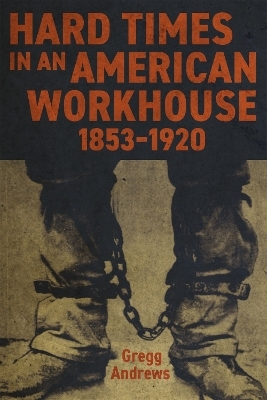
Hard Times in an American Workhouse, 1853-1920
Seiten
2024
Louisiana State University Press (Verlag)
978-0-8071-8278-9 (ISBN)
Louisiana State University Press (Verlag)
978-0-8071-8278-9 (ISBN)
The first comprehensive examination of a workhouse in the United States, offering a critical history of the institution in the Gilded Age and Progressive Era. Using the Old St. Louis Workhouse as a representative example, Gregg Andrews brings to life individual stories of men and women sentenced to this debtors' prison.
Hard Times in an American Workhouse, 1853 1920, is the first comprehensive examination of a workhouse in the United States, offering a critical history of the institution in the Gilded Age and Progressive Era. Using the Old St. Louis Workhouse as a representative example, award-winning historian Gregg Andrews brings to life individual stories of men and women sentenced to this debtors' prison to break rocks in the quarry, sew clothing, scrub cell floors and walls, or toil in its brush factory. Most inmates, too poor to pay requisite fines, came through the city's police courts on charges of vagrancy, drunkenness, disturbing the peace, or violating some other ordinance. The penal system criminalized everything from poverty and unemployment to homelessness and the mere fact of being Black. Workhouses proved overcrowded and inhospitable facilities that housed hardcore felons and young street toughs along with prostitutes, petty thieves, peace disturbers, political dissenters, ""levee rats,"" adulterers, and those who suffered from alcohol and drug addiction. Officials even funneled the elderly, the mentally disabled, and the physically infirm into the workhouse system.
The torture of prisoners in the hellish chambers of the St. Louis Workhouse proved far worse than Charles Dickens's portrayals of cruelty in the debtors' prisons of Victorian England. The ordinance that created the St. Louis complex in 1843 banned corporal punishment, but shackles, chains, and the whipping post remained central to the institution's attempts to impose discipline. Officers also banished more recalcitrant inmates to solitary confinement in the ""bull pen,"" where they subsisted on little more than bread and water. Andrews traces efforts by critics to reform the workhouse, a political plum in the game of petty ward patronage played by corrupt and capricious judges, jailers, and guards. The best opportunity for lasting change came during the Progressive Era, but the limited contours of progressivism in St. Louis thwarted reformers' efforts. The defeat of a municipal bond issue in 1920 effectively ended plans to replace the urban industrial workhouse model with a more humane municipal farm system championed by Progressives.
Hard Times in an American Workhouse, 1853 1920, is the first comprehensive examination of a workhouse in the United States, offering a critical history of the institution in the Gilded Age and Progressive Era. Using the Old St. Louis Workhouse as a representative example, award-winning historian Gregg Andrews brings to life individual stories of men and women sentenced to this debtors' prison to break rocks in the quarry, sew clothing, scrub cell floors and walls, or toil in its brush factory. Most inmates, too poor to pay requisite fines, came through the city's police courts on charges of vagrancy, drunkenness, disturbing the peace, or violating some other ordinance. The penal system criminalized everything from poverty and unemployment to homelessness and the mere fact of being Black. Workhouses proved overcrowded and inhospitable facilities that housed hardcore felons and young street toughs along with prostitutes, petty thieves, peace disturbers, political dissenters, ""levee rats,"" adulterers, and those who suffered from alcohol and drug addiction. Officials even funneled the elderly, the mentally disabled, and the physically infirm into the workhouse system.
The torture of prisoners in the hellish chambers of the St. Louis Workhouse proved far worse than Charles Dickens's portrayals of cruelty in the debtors' prisons of Victorian England. The ordinance that created the St. Louis complex in 1843 banned corporal punishment, but shackles, chains, and the whipping post remained central to the institution's attempts to impose discipline. Officers also banished more recalcitrant inmates to solitary confinement in the ""bull pen,"" where they subsisted on little more than bread and water. Andrews traces efforts by critics to reform the workhouse, a political plum in the game of petty ward patronage played by corrupt and capricious judges, jailers, and guards. The best opportunity for lasting change came during the Progressive Era, but the limited contours of progressivism in St. Louis thwarted reformers' efforts. The defeat of a municipal bond issue in 1920 effectively ended plans to replace the urban industrial workhouse model with a more humane municipal farm system championed by Progressives.
Gregg Andrews is Distinguished Professor Emeritus of History at Texas State University and the award-winning author of seven books, including Shantyboats and Roustabouts: The River Poor of St. Louis, 1875-1930.
| Erscheinungsdatum | 08.10.2024 |
|---|---|
| Zusatzinfo | 22 halftones |
| Verlagsort | Baton Rouge |
| Sprache | englisch |
| Maße | 152 x 229 mm |
| Themenwelt | Geisteswissenschaften ► Geschichte ► Regional- / Ländergeschichte |
| Sozialwissenschaften ► Soziologie | |
| ISBN-10 | 0-8071-8278-8 / 0807182788 |
| ISBN-13 | 978-0-8071-8278-9 / 9780807182789 |
| Zustand | Neuware |
| Informationen gemäß Produktsicherheitsverordnung (GPSR) | |
| Haben Sie eine Frage zum Produkt? |
Mehr entdecken
aus dem Bereich
aus dem Bereich
Erinnerungen
Buch | Softcover (2024)
Pantheon (Verlag)
16,00 €


